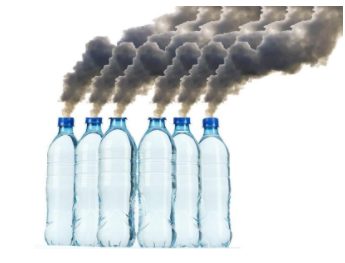 (By 350 CO ally Jamie Blatter)
(By 350 CO ally Jamie Blatter)
Fossil fuels and plastics are in an unhealthy love triangle with the American public and it is harming us, our wildlife and the planet. Ask individuals about the negative effects that plastic has on the environment, and you are likely hear about the floating island of plastic in our oceans, how plastics virtually never bio-degrade, and about litter’s negative effects on wildlife and landscapes. However, there is another sinister facet of plastics that is integral to understanding the full picture.
The world’s largest fossil fuel companies process oil and gas from which plastics are made. In fact, 99% of plastics are made from chemicals that are sourced from fossil fuels. Due to the abundance of “affordable” shale gas in the US and other fossil fuel derivatives, plastic can be made extremely cheaply, by transforming ethane into ethylene (the foundation of polyethylene, the most common form of plastic) and propane into propylene (the foundation of food packaging). Perhaps what makes the plastic industry, and their equally influential lobbyists working the halls of state and federal agencies as well as politicians, such formidable foes is foundational ties linking oil, gas and plastics production. So pervasive is this link that the International Energy Agency predicts that by 2050, plastic production will consume more oil than cars. The more heavily we rely on plastics, the more we embed, to our detriment, a reliance on fossil fuels in our daily lives.
In 1933, Colorado enacted a law that prohibits local governments from banning the use or sale of specific types of plastic materials. 1933 was at a time when the economy was in the grip of a world-wide depression, jobs were scare, and plastic was becoming widespread in its use after its discovery in 1907. Since that time, and despite is many uses, we have come to view plastics through a lens that includes environmental concerns. This year three environmental bills have been introduced for consideration. This action by bold legislators could mark the beginning of a landmark year in the relationship between plastics, their makers, and our government and its role in protecting us and our environment. Bill SB20-010 would repeal the outdated 1933 law, allowing local governments to create their own legislation to regulate plastics. A second bill (HB20-1163) would prohibit stores and retail food establishments from providing single use plastics, such as carryout bags, stirrers, and straws, beginning in 2021. Finally, HB20-1162 would prohibit retail food establishments from distributing expanded polystyrene (Styrofoam) beginning in 2022. We as Coloradoans must be on the right side of this fight.
Although the implications of these bills cannot be understated, the fight does not stop in 2020. We must continue to stay vigilant. Plastic is not only found in single use packaging but has trickled into every aspect of life. Clothing is woven from miniscule plastic fibers, aluminum cans are lined with plastic, and even chewing gum contains plastic. Microplastic is found in seawater, rainforests, alpine tundra, drinking water and the air we breathe.
As plastic bans are being implemented in many developed countries, the oil and gas industry is shifting their sights to developing countries. They are targeting communities and countries where regulation is lax and voices are stifled by corruption. We must make an example by standing up against this unethical behavior, helping to save our planet and upholding our dignity by speaking for those who voices will not be heard.
With our continued voices, Colorado can emerge into a position of environmental leadership on issues of oil and gas, plastics, and beyond. We and our planet depend on us taking a stand.
Jamie is professionally trained in journalism and conservation strategies. She devotes much of her writing and research time to exploring Colorado’s past, present, and future role in the global ecological crisis. She has spent much of her career on public lands, training and inspiring youth in the field of environmental stewardship. Jamie is passionate about education and public engagement. She currently works to help the Denver area transition to wiser energy and water usage.

